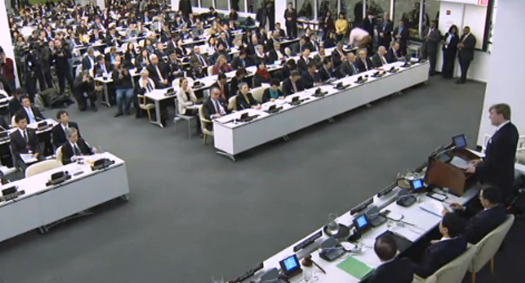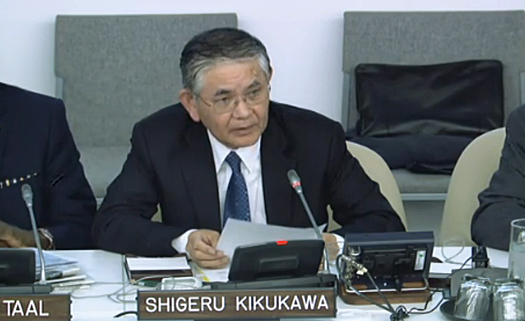Better flood and drought preparedness urged by high-level UN session on water-related disasters
Involvement of local communities, early warning systems and cooperation among countries are some of the measures needed to increase resilience to water-related disasters, United Nations officials stressed during the High-level expert panel on Water and disasters at the UN Headquarters in New York on March 6.
The meeting was convened by the UNSGAB water and sanitation advisory board of secretary-general Ban Ki-Moon.
"Preparing for the worst can save lives. That is why we need early warning systems, disaster education and resilient structures," Ban Ki-moon said in his opening speech.
Post-2015 goal for risk reduction
Besides sharing experiences and discussing global cooperation, the meeting was organized to create a political momentum for a global goal on flood risk reduction.
UNSGAB wants risk reduction of water-related disasters to be part of the new post-2015 water goals as presently discussed by many UN agencies.
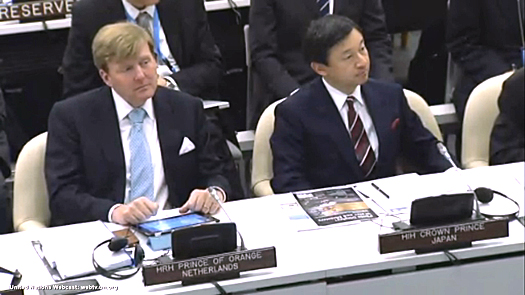
Presence of two princes: Dutch Prince of Orange (left) and Japan's crown prince Naruhitu (right)
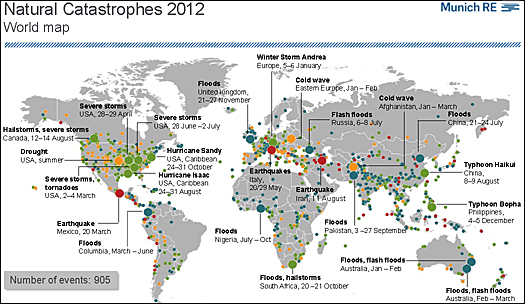
According to chief risk researcher Peter Höppe of the German insurance company Munich Re, in 2012 worldwide 905 major natural disasters occurred, killing 9,500 people (the average over the last ten years is 106,000). The flood disasters (in blue) were not very lethal in 2012 but with 325 its number rises every year.
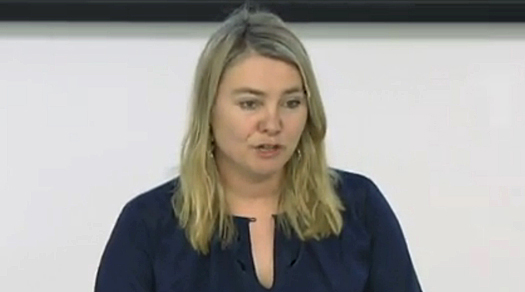
Dutch minister Melanie Schultz-van Haegen advocated a stronger role for citizens and engineers.
Learning from history
The Advisory Board’s Honorary President, Crown Prince Naruhito of Japan, said that better preparedness was key. “By making use of available means and learning lessons from history, I believe we can create a society more resilient to disasters,” he said. “We can turn chains of destruction into chains of recovery.”
Longer droughts, more floods
Prince of Orange Willem-Alexander of the Netherlands, who chairs the Advisory Board, noted that water-related disasters cannot be banned. "It is a certainty that we will see even more water-related disasters in the coming years. Climatic shifts means stronger storms, longer droughts and more coastal flooding", he said.
"It is clear that one water-related disaster can wash away in a moment years of progress, compromising communities' ability to reach their development objectives", continued the Dutch prince, underlining the need to further reduce the suffering.
"We are here to share stories, learn from our experiences and build momentum and galvanize political commitment for a stronger global response."
Prepared for the ultimate event
Ministers from Japan, Thailand, Gambia, Egypt and Indonesia shared their experiences with recent floods and droughts. Japan's vice minister infrastructure Shigeru Kikukawa advised the participants of the meeting to be well prepared for that one rare mega event.
Kikukawa: "We are introducing a multi-layer protection plan for the occasion of a surge to overflow our levees again. We involve the communities and inform them about routes to higher grounds."
He also advised to prepare for a quick and efficient response. "After a flood, inundation makes it difficult to reach certain locations. A good transportation plan is very important," said the Japanese minister.
Gratitude from Ban Ki-Moon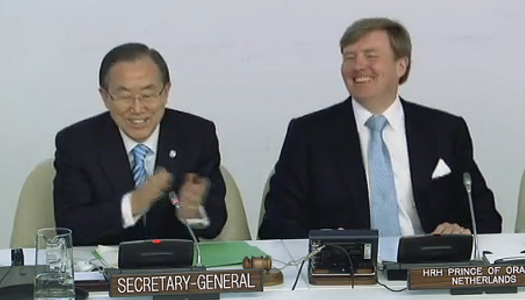
At the end of the opening session secretary-general Ban Ki-Moon thanked prince of Orange as chairman of UNSGAB. Next month the prince will become king of the Netherlands and will resign from all his current official functions, ending his cachair of UNSGAB for seven years.
Ban Ki-Moon expressed his admiration for the prince's instrumental leadership, bringing the important issue of water to the global agenda.
WebTV recording of all four sessions
Opening session with key note speeches by UN Secretary-general Ban Ki-Moon, Crown prince Naruhito of Japan, Prince of Orange Willem-Alexander of the Netherlands and former South Korean prime minister Dr. Han Seung-soo
Morning session with speeches by deputy prime minister Kittiratt Na-Ranong of Thailand, president Mohamed Bahaa El-Din of the African Ministers' Council on water (AMCOW), minister Melanie Schultz-van Haegen of the Netherlands, Peter Höppe of Munich Re
Afternoon session on experiences and lessons learned with contributions by vice minister Shigeru Kikukawa of Japan, Commanding general Thomas Bostick of the US Army Corps of Engineers, executive secretary Bai-Mass Taal of AMCOW, director international cooperation Florika Fink-Hooijer of the European Commission
Closing session with reflections on possible regional and global cooperation with contributions by executive secretary Ania Grobicki of the Global Water Partnership, president Benedito Braga of the World Water Council, assistant director general Gretchen Kalonij of Unesco and WooChong Um of the Asian Development Bank
More information
United Nations Secretary-General's Advisory Board on water and sanitation (UNSGAB)
High level expert panel on water and disaster (HLEP)
New York, USA
+1 212 963 8590
www.unsgab.org
International Flood Initiative
Tsukuba-shi, Japan
+81 29 879 6809
ww.ifi.home




